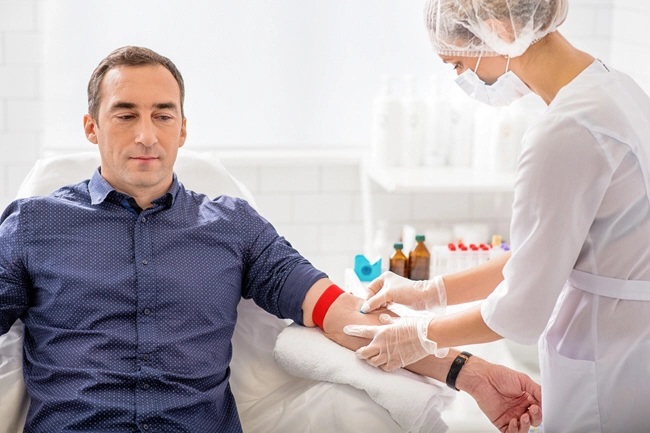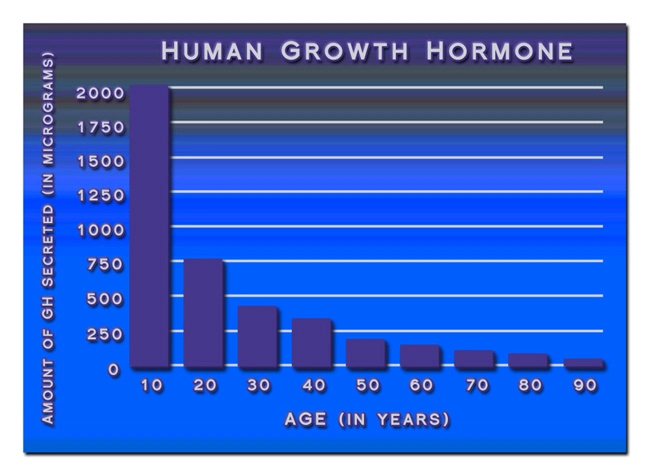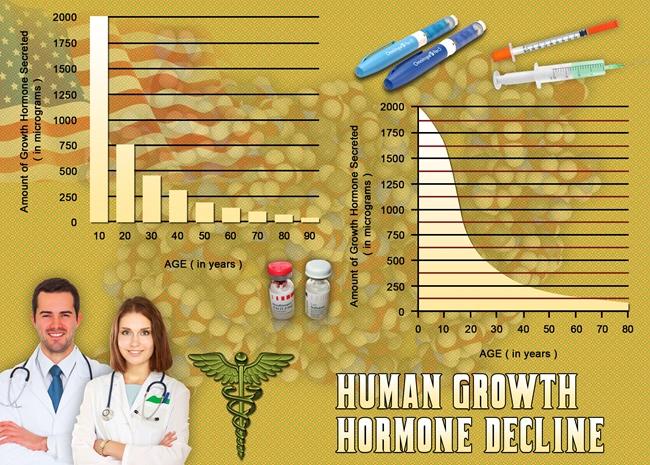
Video Link: https://vimeo.com/285651993
Video Download: Click Here To Download Video
Video Stream: Click Here To Stream Video
The Small Gland That Does Such a Huge Job
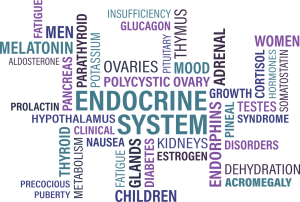 When considering Human Growth Hormone Replacement Therapy, the first gland that comes to mind is the pituitary gland. This is because the pituitary is the gland responsible for producing and secreting Growth Hormone.
When considering Human Growth Hormone Replacement Therapy, the first gland that comes to mind is the pituitary gland. This is because the pituitary is the gland responsible for producing and secreting Growth Hormone.
But all of the other glands in the body play vital roles as well. In fact, most glands work as a team, in the correct balance.
Growth Hormone replacement therapy can help to maintain that all-important balance. Here's a look at the crucial hypothalamus gland.
The hypothalamus acts as an internal regulator of many bodily functions, such as the electrode and fluid ratio, body weight, and blood pressure.
It receives feedback from the body and makes the necessary adjustments to keep these functions in the correct balance.
An excellent way to look at the hypothalamus is to envision it as a “command message center,” acting as a link between the brain and the pituitary, adrenals and other organs by delivering the brain's signals.
For a more precise, scientific explanation, the hypothalamus is a link between the central nervous system and the endocrine system. The body temperature, energy levels, and circadian rhythm are all in balance as a direct result of the hypothalamus.
For example, imagine that the brain receives a danger signal or stimulus.
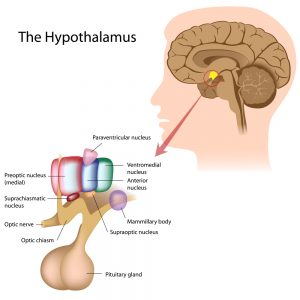 Immediately, the message is sent to the hypothalamus, which then sends out corticotropin-releasing hormone (CRH). This hormone's primary function is to act as the hypothalamus glands' message service to the pituitary gland.
Immediately, the message is sent to the hypothalamus, which then sends out corticotropin-releasing hormone (CRH). This hormone's primary function is to act as the hypothalamus glands' message service to the pituitary gland.
This results in the pituitary firing up adrenocorticotropic hormone (ACTH), which causes the adrenal glands to make cortisol, the so-called “stress hormone.”
Through a series of complex chemical interactions, cortisol kicks in the body's “fight-or-flight” mode and prepares us to deal with the danger.
This is done due to the many functions of cortisol. This hormone is a potent anti-inflammatory agent and prevents bleeding by drawing the blood from the surface and delivering it to the muscles.
At some point, the cortisol reaches the needed level, and the signal goes back to the hypothalamus to “switch off.” This is merely one of the life-saving roles that this tiny yet powerful hypothalamus gland plays. Here are several others -- the hypothalamus gland:
Signals thirst and hunger
Helps to stabilize mood
Regulates libido
Assists with metabolism and growth
Governs fluid and electrolyte balance, body weight, body temperature, and blood pressure
Makes constant adjustments if any of these delicate balances are out-of-whack
Influences sleep cycles
The gland is located above the pituitary gland and the brain stem (medulla oblongata) and below the thalamus gland.
A Small but Mighty Engine
If all of the above functions weren't enough, the hypothalamus has still more roles. In addition to the corticotropin-releasing hormone mentioned earlier, there are several more hormones secreted by the hypothalamus gland:
Oxytocin. Also known as “the love hormone” and “the cuddle hormone,” oxytocin is the hormone most responsible for cooperation and bonding, as well
 as processing social information. One fascinating fact: oxytocin is antagonistic to the powerful male hormone testosterone. But the two different hormones need each other. Testosterone is ideal for aggression as necessary (in serious competition), and oxytocin, which is perfect for when the day is done, the (“hunt”) is over, and it's time to calm down, switch off the aggression and return to the family. Men will quite often have higher levels of testosterone than oxytocin. But a healthy hypothalamus will strive to keep oxytocin levels adequate.
as processing social information. One fascinating fact: oxytocin is antagonistic to the powerful male hormone testosterone. But the two different hormones need each other. Testosterone is ideal for aggression as necessary (in serious competition), and oxytocin, which is perfect for when the day is done, the (“hunt”) is over, and it's time to calm down, switch off the aggression and return to the family. Men will quite often have higher levels of testosterone than oxytocin. But a healthy hypothalamus will strive to keep oxytocin levels adequate.Vasopressin, also known as an Anti-diuretic hormone (ADH). This hormone's task is to retain sufficient levels of water in the body. Vasopressin swings into action when the body is suffering from dehydration. It does this by slowing down the kidneys to reduce the flow of urine. In large amounts, vasopressin can also increase blood pressure by causing moderate vasoconstriction (the narrowing of blood vessels as a result of tightening their walls), thus conserving more bodily fluid. Also, some users of vasopressin analogs (compounds of related molecular constructions) report brain-boosting benefits and consider vasopressin a nootropic (smart drugs and cognitive enhancers). Many have claimed rapid, temporary improvements in writing, speaking, memory, and overall mental clarity when faced with a need for peak mental performance, such as giving a speech or taking an exam.
Prolactin-releasing hormone (PRH). As the name of this hormone implies, it releases Prolactin (PRL). Prolactin stimulates the production and secretion of milk and also plays a vital role in motherhood by raising levels of oxytocin, which develops a heightened degree of sensitivity and allows deep bonding between mother and baby.
Thyrotropin-releasing hormone (TRH). This hormone stimulates the release of Thyroid Stimulating Hormone (TSH). This hormone is produced by the hypothalamus and released, then moves through the median eminence to the pituitary gland, where it begins to secrete Thyroid Stimulating Hormone to balance the levels of Thyroxine (T4) and Triiodothyronine (T3). These two hormones are essential internal regulators of the body and perform a wide array of functions.
Growth hormone-releasing hormone (GH-RH). This vital hormone stimulates the release of Growth Hormone, which is the building block of the human body. Growth Hormone is responsible for building muscle tissue, rejuvenating cells, maintaining optimal mental function, easing joint aches and pains, and sending energy shooting through the body
Gonadotropin-releasing hormone (GnRH). This hormone is released by the hypothalamus into small blood vessels to the pituitary gland, where it produces two other hormones: Follicle-stimulating hormone and Luteinizing hormone. These hormones flow into general circulation and act directly on the testes and ovaries to initiate and maintain their reproductive functions. As with other hormones, the level of both these substances is a delicate balance: too low concentrations will prevent a child from developing through puberty. Excessively high levels will result in a condition called pituitary adenomas (tumors). Fortunately, this rarely occurs.
Problems with the Hypothalamus
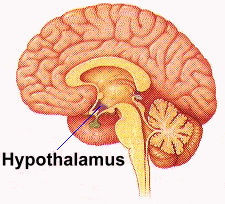 A severe injury to the head can result in Hypothalamic Disease. Also, several other causes such as radiation, infection, malnutrition, surgery, and brain tumors all can lead to a damaged hypothalamus.
A severe injury to the head can result in Hypothalamic Disease. Also, several other causes such as radiation, infection, malnutrition, surgery, and brain tumors all can lead to a damaged hypothalamus.
Due to the proximity of the hypothalamus to several other glands, injury to the gland can have a significant number of adverse effects.
Worse, it can be challenging for physicians to determine if the cause of the problems originates in the hypothalamus or the pituitary gland.
Women undergoing long-term hormone replacement therapy (HRT) may experience their estrogen receptors breaking down in the hypothalamus, leaving them more vulnerable to cancer.
Exercise seems to offer the best prevention against this problem.
Fortunately, hormone blood tests are valid and point the doctors in the right direction.
When undergoing hormone replacement therapy at our clinic, we will continuously monitor this all-important gland.
As you can see, the hypothalamus is indeed “a small but mighty engine.”
This gland plays a role in so many of the body's internal functions that it is tempting to ask: “what happens in the body that this gland does not have a hand in?” The answer: “Not much”!
Contact us for a FREE, no-obligation discussion about the benefits of growth hormone restoration.
Contact Us Today For A Free Consultation
Dear Patient,
Once you have completing the above contact form, for security purposes and confirmation, please confirm your information by calling us.
Please call now: 1-800-380-5339.
Welcoming You To Our Clinic, Professor Tom Henderson.

- New Research on Hormone Replacement Therapy [Last Updated On: December 29th, 2024] [Originally Added On: March 12th, 2021]
- LCN2 Hormone Suppresses Hunger and Stops Cravings! [Last Updated On: January 27th, 2025] [Originally Added On: April 7th, 2021]
- Melatonin: The Body's Master Clock [Last Updated On: December 27th, 2024] [Originally Added On: April 8th, 2021]
- The Importance of Luteinizing Hormone [Last Updated On: December 28th, 2024] [Originally Added On: April 11th, 2021]
- Andropause From The Wikipedia Encyclopedia [Last Updated On: December 29th, 2024] [Originally Added On: April 12th, 2021]
- Finally Explained: The Mysterious Pineal Gland [Last Updated On: December 28th, 2024] [Originally Added On: April 30th, 2021]
- Hormone Therapy May Help Cut Alzheimer's Risk [Last Updated On: November 24th, 2024] [Originally Added On: May 18th, 2021]
- Androgel : Men Getting Their Mojo Back! [Last Updated On: June 3rd, 2024] [Originally Added On: May 21st, 2021]
- HGH Secretagogue [Last Updated On: November 24th, 2024] [Originally Added On: May 22nd, 2021]
- Hormone Replacement Therapy Safe, Study Suggests [Last Updated On: June 8th, 2024] [Originally Added On: May 24th, 2021]
- The HGH Recommended Medical Dosage - The Importance of Blood Work [Last Updated On: November 24th, 2024] [Originally Added On: May 25th, 2021]
- Act Now to Prevent the Increasingly Common Condition of Hypothyroidism [Last Updated On: September 22nd, 2024] [Originally Added On: June 21st, 2021]
- A Toxic Hormone is Altering the Sex and Reproduction of Aquatic Life in United States Streams [Last Updated On: November 24th, 2024] [Originally Added On: August 16th, 2021]
- New Research: Cognitive Therapy Could Reduce Menopausal Hot Flashes [Last Updated On: November 23rd, 2024] [Originally Added On: August 16th, 2021]
- Heart Benefits From Hormone Replacement Therapy? [Last Updated On: November 22nd, 2024] [Originally Added On: August 18th, 2021]
- Risks of Hormones in Early Menopause Challenged [Last Updated On: November 21st, 2024] [Originally Added On: August 24th, 2021]
- Comprehensive Hormone Replacement Therapy with Tesamorelin [Last Updated On: May 29th, 2024] [Originally Added On: September 18th, 2021]
- Early Hormone Replacement Therapy May Lower Alzheimer Risk [Last Updated On: November 14th, 2024] [Originally Added On: October 25th, 2021]
- Stimulate HGH: Growth Hormone Secretagogue: Sermorelin Acetate [Last Updated On: November 20th, 2024] [Originally Added On: October 25th, 2021]
- Growth Hormone Therapy Reverses Biological Age In Groundbreaking Study [Last Updated On: November 11th, 2024] [Originally Added On: October 25th, 2021]
- Estrogen HRT May Reduce Breast Cancer Risk [Last Updated On: November 9th, 2024] [Originally Added On: October 26th, 2021]
- Hormone Replacement Therapy is Safe [Last Updated On: November 15th, 2024] [Originally Added On: October 26th, 2021]
- The Benefits of IGF-1 [Last Updated On: November 10th, 2024] [Originally Added On: October 26th, 2021]
- Insulin-Similar Growth Factor Benefits [Last Updated On: November 16th, 2024] [Originally Added On: October 26th, 2021]
- Growth Hormone Dosage [Last Updated On: November 8th, 2024] [Originally Added On: October 26th, 2021]
- Growth Hormone Sprays [Last Updated On: November 7th, 2024] [Originally Added On: October 26th, 2021]
- The Best Ways to Boost Growth Hormone [Last Updated On: November 13th, 2024] [Originally Added On: October 26th, 2021]
- Growth Hormone Explained [Last Updated On: November 17th, 2024] [Originally Added On: October 26th, 2021]
- What Men Need To Know About Testosterone And Growth Hormone [Last Updated On: November 5th, 2024] [Originally Added On: October 26th, 2021]
- Growth Hormone and Gene Therapy [Last Updated On: November 6th, 2024] [Originally Added On: October 26th, 2021]
- Growth Hormone and the Law [Last Updated On: November 4th, 2024] [Originally Added On: October 27th, 2021]
- Growth Hormone and Testosterone Replacement Therapy [Last Updated On: January 2nd, 2025] [Originally Added On: October 27th, 2021]
- Growth Hormone and Pneumonia [Last Updated On: November 2nd, 2024] [Originally Added On: October 27th, 2021]
- An Introduction to Growth Hormone [Last Updated On: November 1st, 2024] [Originally Added On: October 27th, 2021]
- General Physician Versus Hormone Specialist – Some Symptoms Require a Specialist to Heal [Last Updated On: August 5th, 2024] [Originally Added On: March 18th, 2022]
- Hormone Impacts And Function Of HGH [Last Updated On: December 20th, 2024] [Originally Added On: July 10th, 2022]
- Cheaping Out on HGH Therapy – JUST DON’T DO IT [Last Updated On: August 18th, 2024] [Originally Added On: July 12th, 2022]
- Slow Aging with Growth Hormone [Last Updated On: June 18th, 2024] [Originally Added On: July 17th, 2022]
- Hormone Therapies: How They Have Evolved and Are Evolving [Last Updated On: August 9th, 2024] [Originally Added On: February 10th, 2023]
